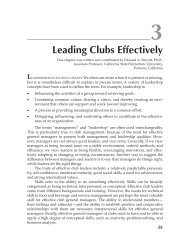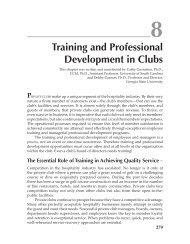Leading the Strategic Planning Process - Club Managers ...
Leading the Strategic Planning Process - Club Managers ...
Leading the Strategic Planning Process - Club Managers ...
- No tags were found...
Create successful ePaper yourself
Turn your PDF publications into a flip-book with our unique Google optimized e-Paper software.
<strong>Leading</strong> <strong>the</strong> <strong>Strategic</strong> <strong>Planning</strong> <strong>Process</strong> 119This discussion often will go on for some time, as participants share <strong>the</strong>irdefinition or view of <strong>the</strong> club in ideal terms. Be careful not to rush this discussion. Itis <strong>the</strong> most foundational discussion in <strong>the</strong> entire process, because it sets <strong>the</strong> club’sdirection. And expect to get a variety of answers—though <strong>the</strong>re may be less variationamong answers if <strong>the</strong> meeting is attended by board members alone. Typically,“Mercedes-Benz,” “BMW,” and “Jaguar” top <strong>the</strong> list of responses.A logical follow-up question establishes <strong>the</strong> current state of <strong>the</strong> club and highlights<strong>the</strong> disparity of members’ views and responses: “Continuing with our caranalogy, what kind of car is <strong>the</strong> club presently?” This question is similar to <strong>the</strong> first,but forces <strong>the</strong> participants to assess <strong>the</strong> club’s actual and current status—what <strong>the</strong>club is—ra<strong>the</strong>r than an intended ideal. Again, plan for an extended discussion asparticipants voice <strong>the</strong>ir opinions about how <strong>the</strong> club meets expectations and whereit may fall short—all in <strong>the</strong> context of <strong>the</strong> club as an automobile. And, as before,expect to get a variety of answers. In addition to <strong>the</strong> answers listed above, answerssuch as “Volkswagen,” “Bentley,” “Chevrolet,” “Ferrari,” and even “Edsel” are notuncommon.While it may seem that you have opened <strong>the</strong> proverbial “can of worms” withthis question, <strong>the</strong> answers are important clues to what <strong>the</strong> club’s members trulythink about <strong>the</strong> club in its present condition. Celebrate <strong>the</strong> fact that you now haveactual data to work with! To turn this data into useful, practical information, youmust compare <strong>the</strong> ideal and actual descriptions of <strong>the</strong> club. This is an effective “gapanalysis” of where you are presently as a club and where you want to be ideally asa club.After comparing answers and identifying <strong>the</strong> gap, you and your plannersshould analyze <strong>the</strong> answers in terms of <strong>the</strong> participants’ demographics and membershipcharacteristics (as much as club tradition and member preferences allow).For example, if most of your tennis-member respondents described <strong>the</strong> currentstate of <strong>the</strong> club in terms of economy or low-end cars, <strong>the</strong>n you might considerexamining <strong>the</strong> tennis department and operation—its facilities, staff, and programs—tosee why it is falling short in <strong>the</strong> opinion of <strong>the</strong>se members.Sometimes it is necessary to probe for more details, in order to elicit richerinformation for use in decision-making. Asking <strong>the</strong> question “What kind of car is<strong>the</strong> club presently?” to assess members’ actual perception of <strong>the</strong> club is good as faras it goes, but if <strong>the</strong> discussion stalls, you can also ask more specific and probingquestions, such as:• What model is <strong>the</strong> car?• What is its condition?• What is <strong>the</strong> quality of its stereo? its tires?• What options does this car have?Depending on <strong>the</strong> willingness and enthusiasm of your group, you may needto keep probing to get people engaged and talking. (Once you get <strong>the</strong>m talking,don't forget to make sure that all of <strong>the</strong>ir responses are recorded—this will getmore difficult as <strong>the</strong> pace of <strong>the</strong> discussion picks up.) For example, if members
















